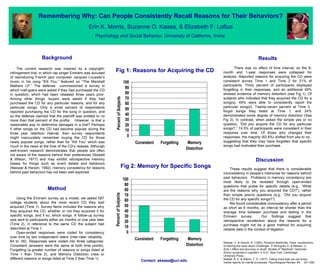
CD_APS poster_07_erin
- 1. Remembering Why: Can People Consistently Recall Reasons for Their Behaviors? Erin K. Morris, Suzanne O. Kaasa, & Elizabeth F. Loftus Psychology and Social Behavior, University of California, Irvine Background The current research was inspired by a copyright- infringement trial, in which rap singer Eminem was accused of reproducing French jazz composer Jacques Loussier’s music in his song “Kill You,” featured on “The Marshall Mathers LP.” The defense commissioned a survey in which mall-goers were asked if they had purchased the CD in question, which had been released three years prior. Among other things, buyers were asked if they had purchased the CD for any particular reasons, and for any particular songs. Only a small percent of respondents reported purchasing the CD for the song in question, and so the defense claimed that the plaintiff was entitled to no more than that percent of the profits. However, is that a reasonable way to determine damages in a trial? Perhaps if other songs on the CD had become popular during the three year retention interval, then survey respondents might inaccurately remember buying the CD for those newly popular songs, rather than for “Kill You” which was much in the news at the time of the CD’s release. Although well-known research demonstrates that people are often not aware of the reasons behind their preferences (Nisbett & Wilson, 1977) and may exhibit retrospective memory biases for things such as event details and behaviors (Neisser & Harsch, 1992), memory consistency for reasons behind past behaviors has not been well explored. Discussion Fig 1: Reasons for Acquiring the CD Fig 2: Memory for Specific Songs Method Results There was no effect of time interval, so the 6- month and 1-year responses were collapsed for analysis. Reported reasons for acquiring the CD were consistent across Time 1 and Time 2 for 21% of participants. Thirty percent of participants displayed forgetting in their responses, and an additional 49% showed evidence of memory distortion (see Fig 1). Of subjects who indicated that they acquired the CD for a song(s), 49% were able to consistently report the particular song(s). Twenty-seven percent at Time 2 forgot songs they listed at Time 1, and 24% demonstrated some degree of memory distortion (See Fig 2). In contrast, when asked the simple yes or no question, “Did you acquire the CD for any particular songs?,” 74.5% of participants were consistent in their response over time. Of those who changed their responses, the majority (63.8%) shifted from yes to no, suggesting that they may have forgotten that specific songs had motivated their purchase. These results suggest that there is considerable inconsistency in people’s memories for reasons behind past behaviors. Problems in memory consistency are most likely to be revealed through open-ended questions that probe for specific details (e.g., “What are the reasons why you acquired the CD?”), rather than simple yes/no questions (e.g., “Did you acquire the CD for any specific songs?”). We found considerable inconsistency after a period as short as 6 months, an interval far shorter than the average time between purchase and testing in the Eminem survey. Our findings suggest that retrospective recollection about the reasons for a purchase might not be a good method for acquiring reliable data in the context of litigation. Using the Eminem survey as a model, we asked 587 college students about the most recent CD they had acquired (Time 1). Survey items included the reasons why they acquired the CD, whether or not they acquired it for specific songs, and if so, which songs. A follow-up survey was sent to participants either six months or one year later (Time 2), in reference to the same CD the subject had described at Time 1. Open-ended responses were coded for consistency over time by two independent raters (inter-rater reliability . 64 to .95). Responses were coded into three categories: Consistent (answers were the same at both time points), Forgetting (a greater number of reasons or songs listed at Time 1 than Time 2), and Memory Distortion (new or different reasons or songs listed at Time 2 than Time 1). Contact: skaasa@uci.edu 0 10 20 30 40 50 60 70 80 90 100 Consistent Forgetting Memory Distortion PercentofSubjects 0 10 20 30 40 50 60 70 80 90 100 Consistent Forgetting Memory Distortion PercentofSubjects Neisser, U. & Harsch, N. (1992). Phantom flashbulbs: False recollections of hearing the news about Challenger. In Winograd, E. & Neisser, U. (Eds.) Affect and accuracy in recall: Studies of “flashbulb” memories. Emory symposia in cognition, 4, 9-31. New York: Cambridge University Press. Nisbett, R. E. & Wilson, T. D. (1977). Telling more than we can know: Verbal reports on mental processes, Psychological Review, 84, 231-259.